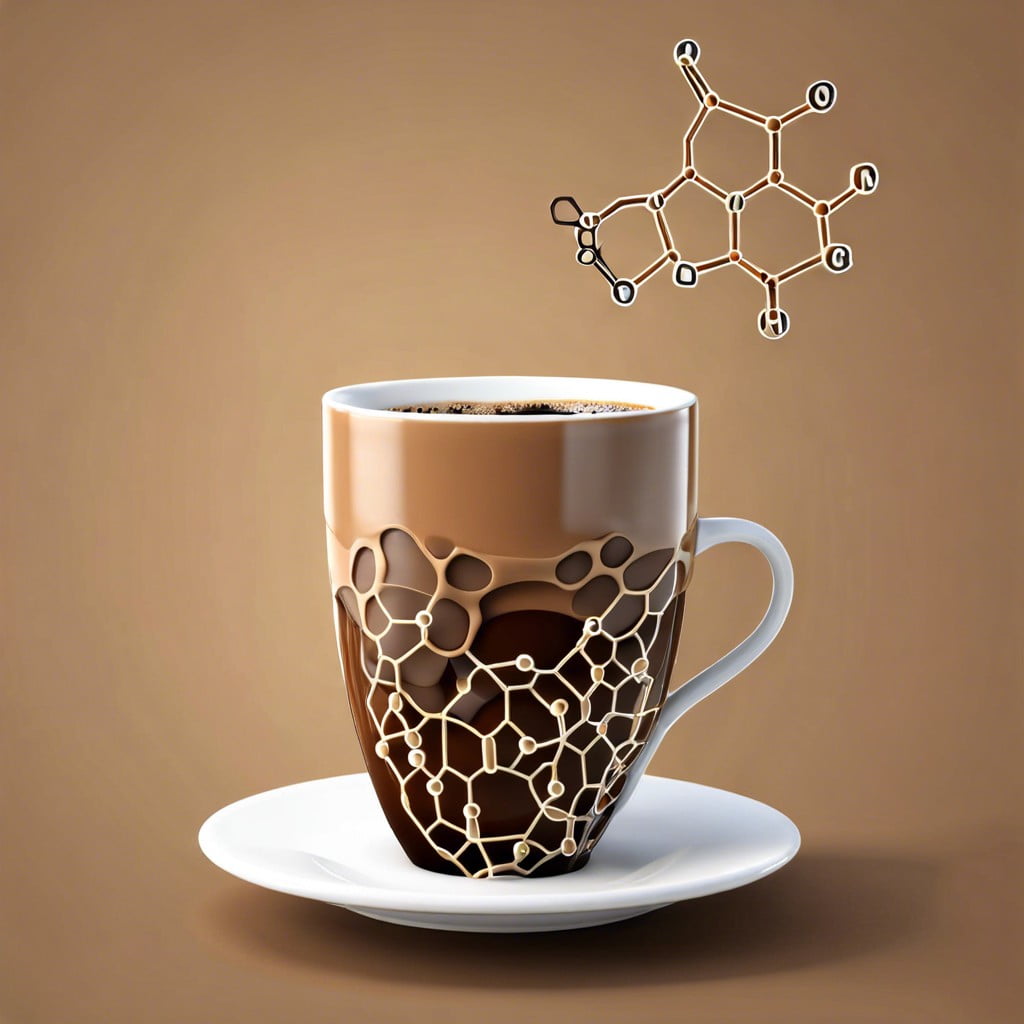Discover why coffee, often consumed for its energizing effects, can sometimes lead to sleepiness.
Caffeine Blocks the Effects of Adenosine

As a natural part of your daily bodily functions, adenosine levels accumulate over time, promoting sleepiness by binding to certain receptors in the brain. Caffeine, sharing a similar structure, competes with adenosine for these binding sites.
When you consume caffeine, it temporarily blocks adenosine from attaching to its receptors, which results in the reduced perception of tiredness.
The alertness you feel after drinking coffee is partly due to this blocking effect. However, adenosine continues to build up in the background, and once the caffeine wears off, the excess adenosine can cause a surge in sleepiness.
Remember, the timing of this rebound can vary; some may experience it sooner than others, depending on individual sensitivity and the amount of caffeine consumed.
Caffeine Tolerance
Regular caffeine consumption leads to tolerance, which means your body becomes accustomed to its effects. When this happens, the stimulating properties diminish, and you may feel less alert or even sleepy after your cup of coffee. This adaptation can compel individuals to increase their caffeine intake to attain the desired level of wakefulness—a cycle that can escalate.
Diving deeper, tolerance develops because your brain cells grow more adenosine receptors—a response to the caffeine-induced blockage. Over time, your brain demands more caffeine to keep these additional receptors occupied, which is why your morning dose may no longer suffice.
The speed at which tolerance builds varies from person to person. Factors such as the frequency of caffeine intake, the dosage, and individual sensitivity all play a role. For some, taking a break from caffeine can reset sensitivity, thereby reducing tolerance and restoring the beverage’s vigor-inducing effects.
Caffeine Metabolism Differences Among Individuals
Individuals metabolize caffeine at varying rates, influenced by factors such as age, liver function, and other health considerations. Those with a faster metabolism tend to process and eliminate caffeine more quickly, reducing its duration of stimulant effects and potentially leading to quicker onset of fatigue post-consumption.
Genetics play a crucial role. Specific genes dictate enzyme production that breaks down caffeine in the liver. Variation in these genes means some people can drink coffee late in the day with no impact on sleep, while others may feel the sedative effects soon after their morning cup.
Medications and dietary factors can also affect caffeine metabolism. Certain drugs interact with enzymes in the liver, either slowing down or speeding up caffeine breakdown. This interaction can alter the expected effects of caffeine, sometimes resulting in unexpected drowsiness.
Pregnancy is another condition that significantly slows caffeine metabolism. Pregnant women may find themselves more sensitive to the effects of caffeine, including the paradoxical sleepy reaction post-consumption.
Understanding your body’s responses to caffeine requires observation and possibly adjustments in your coffee drinking habits. By better understanding your personal caffeine metabolism, you can tailor your coffee intake to align with your body’s specific rhythms and needs.
Genetic Factors Impacting Caffeine Sensitivity
Genes play a significant role in determining your sensitivity to caffeine. Key among these are CYP1A2 and AHR, which influence caffeine metabolism speed in the liver. Individuals with certain variations of the CYP1A2 gene metabolize caffeine faster, potentially reducing its stimulating effects and leading to quicker onset of tiredness.
Additionally, variations in the ADORA2A gene, linked to adenosine receptors, can make some people more likely to experience the sedative effects of caffeine. These genetic differences can explain why a standard cup of coffee might energize one person while making another feel sleepy.
Understanding your genetic makeup can provide insights into your personal caffeine sensitivity and guide your coffee consumption habits. However, genetic testing solely for this purpose isn’t always practical. Observing your body’s response to caffeine is typically sufficient for adjusting your intake.
Strategic Coffee Consumption to Avoid Drowsiness
To sidestep the paradoxical sleepy reaction after coffee intake, consider the timing of your consumption. Sipping your cup at times of natural cortisol spikes, such as early morning or early afternoon, leverages your body’s inherent alertness. Avoid late afternoon or evening coffee to prevent interference with your sleep cycle.
Additionally, moderate your intake. Instead of a large, single dose, small, frequent amounts can sustain alertness without leading to a crash. Overconsumption can overwhelm the nervous system, leading to fatigue once the initial surge subsides.
Pair your coffee with a balanced meal or snack. Food slows caffeine absorption, providing a more even release of energy and reducing the chances of subsequent drowsiness.
Lastly, keep hydrated. Dehydration can cause fatigue, and though coffee itself isn’t dehydrating, it’s no substitute for water. Regular water intake, especially when consuming caffeine, will help maintain energy levels.